Resources
Welcome to the Creative Learning Resources Hub – a curated collection of books & publications, teaching learning tools & games, and presentations developed over 25 years of innovation in holistic education. These resources reflect our commitment to nurturing creativity, empathy, and critical thinking in every learner.
Books and Publications

Creative Learning - A Handbook for Teachers and Trainers by Vijoy Prakash
In this era of information-based socio-economic order, creativity is going to become an all-important quality. The challenge before us is to design an education system which may enable us to develop creativity in society so that we can acquire the ever-expanding base of information and apply it to the best use of humanity. Authored by Vijoy Prakash, the book examines the basic concepts of education and suggests approaches and methods for their improvement. Designed as a handbook for teachers, trainers, academicians and parents, this book offers a comprehensive plan for the overhaul of our education system, which will enable it to meet the demands of the present, and the fast-approaching future.
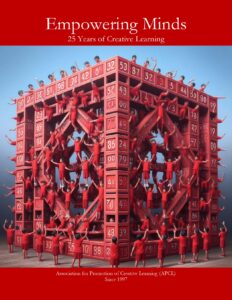
Empowering Minds - 25 Years of Creative Learning by Vijoy Prakash and Mridula Prakash
Empowering Minds: 25 Years of Creative Learning chronicles the inspiring journey of the Association for Promotion of Creative Learning and its flagship School of Creative Learning in Patna, Bihar. Founded in 1997, APCL was born from the vision of nurturing creativity and fostering an inclusive learning environment for all children, especially those from marginalised communities.
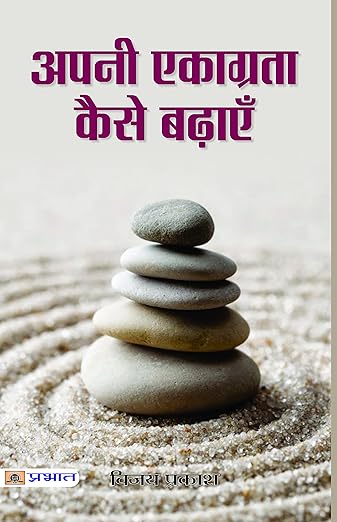
Apni Ekaagrata Kaise Badhaye by Vijoy Prakash
प्राचीनकाल से ही भारतीय शैक्षिक प्रक्रियाओं में एकाग्रता-विकास को बहुत महत्त्व दिया गया। आश्रमों में आचार्य अपने शिष्यों को विविध योगाभ्यासों के जरिए एकाग्रता के गुर सिखाते थे। आधुनिक शिक्षा-प्रणाली में एकाग्रता-विकास के इस महत्त्वपूर्ण पक्ष की पूरी तरह से उपेक्षा कर दी गई है। हमने बच्चों के ऊपर सूचनाओं का बोझ बढ़ाने में कोई कसर नहीं छोड़ी है। नतीजतन बच्चों की उपलब्धि का स्तर नीचे आ गया है और वे महज रट्टू तोते बनकर रह गए हें। यदि हमें रटंत विद्या को छोड़कर सृजनवादी शिक्षा को प्रोत्साहित करना है तो यह आवश्यक है कि हम नवाचारी ढंग से सोचें। एकाग्रता-विकास में ही सृजनवादी शिक्षा की कुंजी है। बिना एकाग्रता के हम किसी कार्य में सफल नहीं हो सकते। सभी मनुष्य के लिए; चाहे वह दुनिया में किसी देश का निवासी हो या किसी पेशे में हो; एकाग्रता विकास की जरूरत रहती ही है। अतः यह आवश्यक है कि हम शिक्षा-पद्धति में एकाग्रता-विकास को सर्वाधिक महत्त्व दें।पुस्तक में एकाग्रता-विकास के तरीके भी सुझाए गए हैं। कक्षा में आसानी से खेले जानेवाले खेलों और संपन्न किए जानेवाले कार्यकलापों के संबंध में भी पर्याप्त सुझाव दिए गए हैं। इन्हें घर में भी किया जा सकता है। अतः यह पुस्तक केवल विद्यालय जानेवाले बच्चों के लिए ही नहीं; बल्कि विद्यालय नहीं जा सकनेवाले बच्चों के लिए भी उपयोगी है।
The Art of Developing Concentration by Vijoy Prakash
Since ancient times, the development of concentration has held great importance in Indian educational practices. In traditional ashrams, gurus would teach their disciples the art of concentration through various yogic practices. However, in modern education systems, this crucial aspect of learning has been almost completely neglected. We have not hesitated to burden children with an overload of information. As a result, academic performance has declined, and children have been reduced to mere rote learners. If we wish to move away from rote learning and promote a creative education system, it is essential to think innovatively. The key to creative education lies in developing concentration. Without concentration, success in any task is difficult. Concentration is essential for everyone - regardless of their country or profession.
Therefore, it is vital that our education system gives utmost importance to concentration-building. This book suggests effective methods for developing concentration. It includes a variety of games and activities that can be easily implemented in the classroom, and even at home. Thus, this book is not only useful for school-going children but also for those who may not be attending school.
Apni Ekaagrata Kaise Badhaye | Written by Vijoy Prakash in Hindi Buy Book on Amazon
Aapli Ekagrata Kashi Vadhavavi | Written by Vijoy Prakash, Marathi translation by Meera Ghandge Buy Book on Amazon
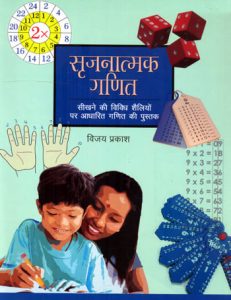
Srijanatmak Ganit by Vijoy Prakash
अक्सर गणित को शुष्क और उबाऊ विषय समझा जाता है, कुछ के लिए तो यह भयावह ही होता है। स्कूल गणित का एक ऐसा चेहरा बन गया है जिसमें सिखाने का तरीका इतना रूखा और औपचारिकतापूर्ण मान लिया गया है कि पुस्तक पढ़ कर गिनती करना और सवाल हल करना ही काफी मान लिया जाता है। यही बच्चे में ऊब और भय पैदा करता है। जबकि गणित तो खेल और रोमांच का विषय है। यदि उसे सही तरीके से पढ़ाया जाए तो बच्चों को खूब मज़ा आए। यह पुस्तक इसी सोच की उपज है। इसके प्रत्येक पृष्ठ में गणित को एक खेल की तरह पढ़ने की कोशिश की गई है। इसमें बोधगम्य रूपों, जीवन्त प्रश्नों और कल्पनाशील चित्रों के जरिए गणित को रोचक और बच्चों के लिए सुगम बनाने का प्रयास किया गया है। पुस्तक विशेष रूप से नवीन शिक्षकों और गणित से जूझते बच्चों के लिए उपयोगी है। शिक्षकों के लिए प्रत्येक पृष्ठ पर टिप्स भी दिए गए हैं। यह पुस्तक भारत के अनेक स्कूलों में बच्चों और शिक्षकों द्वारा प्रयोग में लाई जा रही है और काफी पसंद की जा रही है। अनेक प्रयोगधर्मी शिक्षक बच्चों को यह पुस्तक भेंट कर रहे हैं।
भारतीय शैक्षिक क्षेत्र में यह पुस्तक के लेखक विजय प्रकाश बिहार सरकार में विभिन्न विभागों में उच्च पदों पर कार्य कर चुके हैं। वे 1981 में भारतीय प्रशासनिक सेवा में चुने गए। शिक्षाविद् विजय प्रकाश ने भारतीय प्रशासनिक सेवा में रहते हुए एक संवेदनशील एवं रचनात्मक अधिकारी के रूप में बिहार और झारखण्ड के कई जिलों में काम किया। उन्होंने शिक्षा और ग्रामीण विकास में अभिनव प्रयोग किए। बिहार और झारखण्ड में समुदाय आधारित प्रारम्भिक शिक्षा कार्यक्रमों के निर्माण एवं क्रियान्वयन में उनकी उल्लेखनीय भूमिका रही। वर्तमान में विजय प्रकाश देश के कई विश्वविद्यालयों और संस्थानों से संबद्ध हैं और शिक्षा सुधार के लिए सक्रिय हैं। वे स्वयं को एक शिक्षक के रूप में ही देखते हैं। भौतिक विज्ञान के छात्र रहे विजय प्रकाश (दिल्ली विश्वविद्यालय) को हिंदी और मैथिली में कविता लिखने का भी शौक है। उनकी कई कविताएं विभिन्न पत्र-पत्रिकाओं में प्रकाशित हो चुकी हैं। शिक्षा और समाज के मुद्दों पर उनके लेख भी प्रकाशित होते रहते हैं। उन्होंने इस पुस्तक को लिखने के अलावा बच्चों के लिए गणित के लिए पोस्टर तथा दीवार लेखन सामग्री का भी सृजन किया है। बच्चों को गणित से दोस्ती कराने के उनके प्रयोगों के लिए शिक्षाविदों द्वारा समय-समय पर प्रशंसा की गई है।
Creative Mathematics by Vijoy Prakash
Mathematics is often considered a dry and difficult subject. For some, it is even frightening. School mathematics has taken on such a rigid and formal face that simply reading the textbook, doing calculations, and solving problems is considered enough. This leads to boredom and fear in children. In truth, mathematics is a subject full of play and excitement. If taught the right way, children can truly enjoy it. This book is born out of that very idea.
Every page of this book attempts to teach math as if it were a game. Through accessible visuals, lively questions, and imaginative illustrations, it makes math engaging and easy for children. The book is especially useful for new teachers and children struggling with math. Each page includes teaching tips for educators. This book is currently being used in many schools across India and is widely appreciated. Many innovative teachers are even gifting it to their students.
The author of this book, Vijoy Prakash, has served in various senior positions in the Government of Bihar. A 1981 batch Indian Administrative Service (IAS) officer, Vijoy Prakash is known as a sensitive and creative administrator who has worked extensively in the fields of education and rural development across several districts in Bihar and Jharkhand. He played a significant role in the design and implementation of community-based early education programs in both states.
Currently, he is associated with several universities and institutions in India and continues to work actively for educational reforms. He considers himself a teacher above all. A student of Physics (Delhi University), Vijoy Prakash also has a passion for writing poetry in Hindi and Maithili, with many of his poems published in various magazines and journals. His essays on education and societal issues are also frequently published. Apart from this book, he has created math posters and wall-based teaching materials for children. His experiments in helping children befriend mathematics have earned praise from educators over the years.
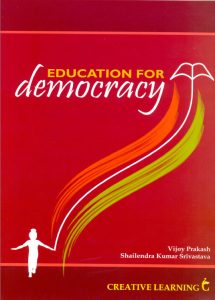
Education for Democracy by Vijoy Prakash & Prof Shailendra Kumar Srivastava
More than half a century has passed since India had adopted democracy as a way of governance. We had also visualised evolution of a democratic society through this process. How far have we moved towards realisation of this goal? How does our adolescent mind think about democracy and democratic way of living? Is our education system capable of producing a citizen as enshrined in our constitution? Now the time has come to study and analyse the mind of school going children who are going to run the future course of our society so as to decide the nature of interventions for our march towards a democratic society.
The book provides an in-depth study conducted on the school going students of Bihar (India) who are going to be the main participants of the democracy in the country. It has tried to diagnose various issues critical for the development of democratic way of living. It also suggests special interventions in the form of ‘Education for Democracy’, which can pave way for evolution of a democratic society. In this connection it outlines the nature of Social Science Laboratories to be established in schools and colleges. It also suggests establishment of Family School to prepare citizens for a democratic society.
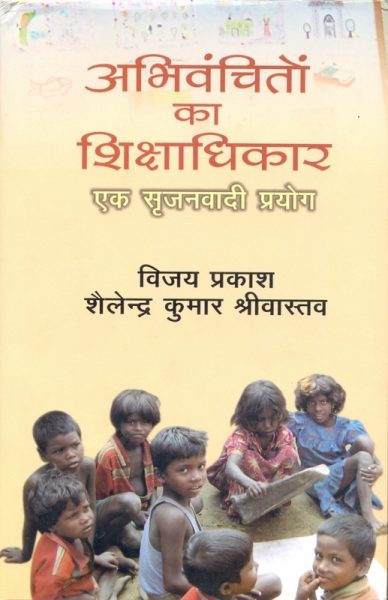
Abhivanchiton Ka Shikshadhikar (Education for Underprivileged) by Vijoy Prakash & Prof Shailendra Kumar Srivastava
Modern education system serves the needs of upper and upper middle class only. Confined to their own world realities Lower middle and middle class children don’t get anything get anything except imitating others. We have tried to take education to underprivileged and marginalised, but we are yet to assess the real impact of this education system on them. This book tries to develop parameters of assessment of nature, quality and quantity of education to different communities. At the same time it provides the assessment of education in different communities based on the detailed census of one Panchayat.
Based on the action research the book also suggests a practical model for making positive intervention empowering underprivileged to take better advantage of the education system.It also underscores that underprivileged children are as much valuable capital as are children from well off families. What is needed is an honest and sincere effort to bring them into mainstream. For this purpose the book also suggets modalities for broadsteaming of education for mainstreming of children.
The book Abhivanchiton ka Shikshadhikar – Education for Underprivileged, authored by Vijoy Prakash and Prof Shailendra Kr Shrivastava has been published by Rajkamal Publication, New Delhi.
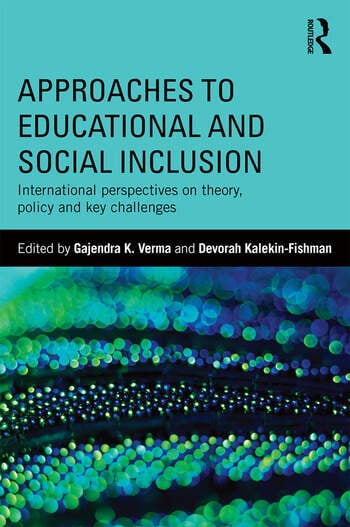
Approaches to Educational and Social Inclusion: International perspectives on theory, policy and key challenges by Gajendra K Verma & Devorah Kalekin-Fishman
The book compiles the papers presented in the International Conference on Educational and Social Inclusion 2011 held at the School of Creative Learning. The conference was jointly organised by Association for Promotion of Creative Learning and the Kanka Gajendra Foundation UK.
In this insightful text, the editors reflect on contributions from scholars representing Bangladesh, Greece, India, Israel, New Zealand, Switzerland, UK and USA, by showing how the majority of educational and social institutions in both developed and developing countries have failed to overcome the many barriers to an effective integrated system of education, suggesting ways as to how these barriers might be challenged.
By looking closely at the overt and covert injuries of educational and social exclusion, a variety of approaches to overcoming the consequences of those challenges is proposed, drawing together strands of social theory, research data and conceptualisations for social action.
The book includes the paper Broad-streaming through Creative Learning: An Approach towards Educational Inclusion presented by Vijoy Prakash at the conference. It includes the paper Inclusive Education and Societal Development: An Indian Perspective by Ran Bijay Narayan Sinha & Rupa Lakshmi.
Gajendra K. Verma is Emeritus Professor of Education at the University of Manchester, UK. Devorah Kalekin-Fishman is Senior Researcher at the University of Haifa, Israel.
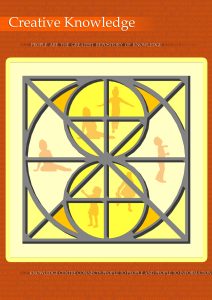
Creative Knowledge
Creative Knowledge was released on the occasion of inaugration of Ritu Sinha Knowledge Centre for Creative Learning at School of Creative Learning on December 27, 2009.
Educational Tools

Alphagram & Alphakshar - Alphabet Generators
Alphabet Generators like Alphagram and Alphakshar are innovative learning tools designed to make the process of learning alphabets engaging, visual, and interactive for young learners. APCL developed unique alphabet generators as part of their focus on nurturing creativity. These generators, known as Alphagrams, are designed to help with learning and recognizing letters. They can be used for various activities, including interactive English lessons and letter games.
Shri Sadananda made the initial drawings of alphabet generators in different languages under guidance from Shri Vijoy Prakash, which was recognised as a grassroot innovation by the Bihar Innovation Forum - a joint initiative of State Innovation Council and Bihar Rural Livelihood Promotion Society. Smt Nupur Nishith improved upon the diagrams and created Alphakshar which has been widely used in our mementos and other diagrams.
Project Reports
National Education Programme & the Devi Charan Chatterjee & Raylaxmi Chatterjee Scholarship for Higher Education
Supported by ActionAid India in Bahadurpur Block of Darbhanga District in Bihar, 2015-2017
The ActionAid-supported final report by the Association for Promotion of Creative Learning (APCL) documents a comprehensive initiative implemented in the Bahadurpur block of Darbhanga district to improve access to quality, equitable education for marginalized communities—especially girls, Dalits, Muslims, and first-generation learners. The project supported 25 girls with higher education scholarships and worked with 80 government schools to reduce child labor, dropouts, and discrimination through awareness campaigns, public hearings, school monitoring, and community mobilization. Key outcomes included school infrastructure improvements, active School Education Committees, community engagement through Meena Manch, and a sharp rise in enrolment and retention. The initiative also addressed systemic issues such as gender-based violence, declining sex ratio, and child marriage through rallies, sensitization programs, and case-based advocacy, resulting in tangible social and educational progress across the region.
The Right to Education Project with PACS in Bahadurpur Block of Darbhanga in Bihar
Supported by Poorest Areas Civil Society (PACS), 2016
The Project Completion Report by the Association for Promotion of Creative Learning (APCL), supported by the Poorest Areas Civil Society (PACS) Programme, outlines a transformative education initiative in Bahadurpur Block of Darbhanga, Bihar, targeting socially excluded communities—especially the Musahars. Through innovative interventions like "Shiksha Dehairs" (women-led education committees), community book banks, awareness campaigns, and platforms like “Adhikar ki Ghanti” (Rights’ Bell), APCL empowered communities to access and demand their Right to Education (RTE). The project tackled entrenched caste, gender, and disability-based discrimination in and around schools, improved school enrolment and mid-day meal delivery, and enabled community-based monitoring of educational rights. With over 130 CBOs formed and sustained through local leadership, the project not only improved access to education but also fostered a culture of rights, representation, and grassroots advocacy that continues to thrive beyond the PACS funding period.
Status of Quality Education and Right to Education in Bihar - A Study of Danapur Block in Patna District
Supported by Oxfam, 2014-2015
The report Status of Quality Education and Right to Education in Bihar presents a critical analysis of the state’s public education system, focusing on its compliance with the Right to Education (RTE) Act. It highlights significant gaps in infrastructure, teacher availability, and child-centric practices across government schools in Bihar. Drawing from field surveys and consultations with stakeholders—especially marginalized communities—the report uncovers persistent issues like discrimination, poor learning outcomes, low community engagement, and lack of accountability. It emphasizes the urgent need for effective implementation of the RTE Act, strengthened School Management Committees (SMCs), improved grievance redressal systems, and inclusive, quality-focused interventions. The report calls for a rights-based approach to education, grounded in equity, transparency, and child empowerment.
Status and Functions of School Management Committee in Bihar
Supported by Oxfam, 2014-2015
The report “Status and Functions of School Management Committees (SMCs) in Bihar” explores the effectiveness and challenges of SMCs in ensuring community participation and school accountability as mandated by the Right to Education (RTE) Act. Based on field studies across 10 districts in Bihar, the report highlights that while SMCs are formed in most schools, their functionality remains weak due to lack of awareness, inadequate training, limited participation by women and marginalized groups, and minimal influence over school decision-making. It emphasizes the need for capacity building, regular meetings, improved understanding of roles, and better coordination between school authorities and communities. Strengthening SMCs is presented as crucial for achieving inclusive, transparent, and quality education across Bihar.
Creative Learning Classes, 2014
APCL organised Creative Learning Classes at Gandhi Maidan and Patna Station in Patna in 2014, aimed at engaging marginalized children through creative learning approaches. The program focused on building rapport and enhancing participation using songs, storytelling, games, drawing, yoga, and roleplay. Activities helped improve concentration, imagination, hygiene awareness, and environmental knowledge. A photographic profile of 59 children was created, and facilitators observed that while children were initially hesitant, they gradually became more confident and expressive. The report highlights the need for further orientation and literacy support, as many children struggled with basic academic skills. Overall, the initiative laid a foundation for continued creative interventions among street and underprivileged children in Patna.
Shikshadhikar - Chaupal Ke Bahas Mein | Citizen's Charter
Supported by ActionAid India in Bahadurpur Block of Darbhanga District in Bihar, 2013
The Citizen's Charter prepared by the Association for Promotion of Creative Learning (APCL) outlines a community-driven framework to improve public education services in Bahadurpur Block of Darbhanga district. Developed through grassroots participation involving children, parents, School Management Committees (SMCs), and Panchayati Raj Institutions (PRIs), the charter articulates citizens’ expectations from the education system—emphasizing transparency, accountability, and rights-based delivery. It highlights key concerns like lack of infrastructure, teacher absenteeism, and discrimination in schools, while proposing measurable standards for school functioning, child rights protection, and grievance redressal mechanisms. The Charter serves as a tool for social accountability, enabling communities to monitor schools and demand quality, inclusive education aligned with the Right to Education (RTE) Act.
Right to Education for Underprivileged in Patania Panchayat in Bihar, 2009
The Right to Education for Underprivileged report by the Association for Promotion of Creative Learning (APCL) documents a grassroots initiative implemented in Patania Panchayat, Bihar, during 2009 to ensure educational access for marginalized communities, particularly the Musahars. Through community surveys, capacity-building workshops, and the establishment of Shabari Ashrams, the project addressed key barriers such as lack of infrastructure, teacher shortages, and social exclusion. Innovative approaches like folk-based learning, public rallies, and child-centered activities helped boost school enrolment, attendance, and awareness of educational rights. The initiative highlighted systemic gaps—like the urgent need for classrooms, toilets, books, and safe drinking water—and called for sustained community involvement, policy advocacy, and the institutionalization of educational rights monitoring mechanisms.
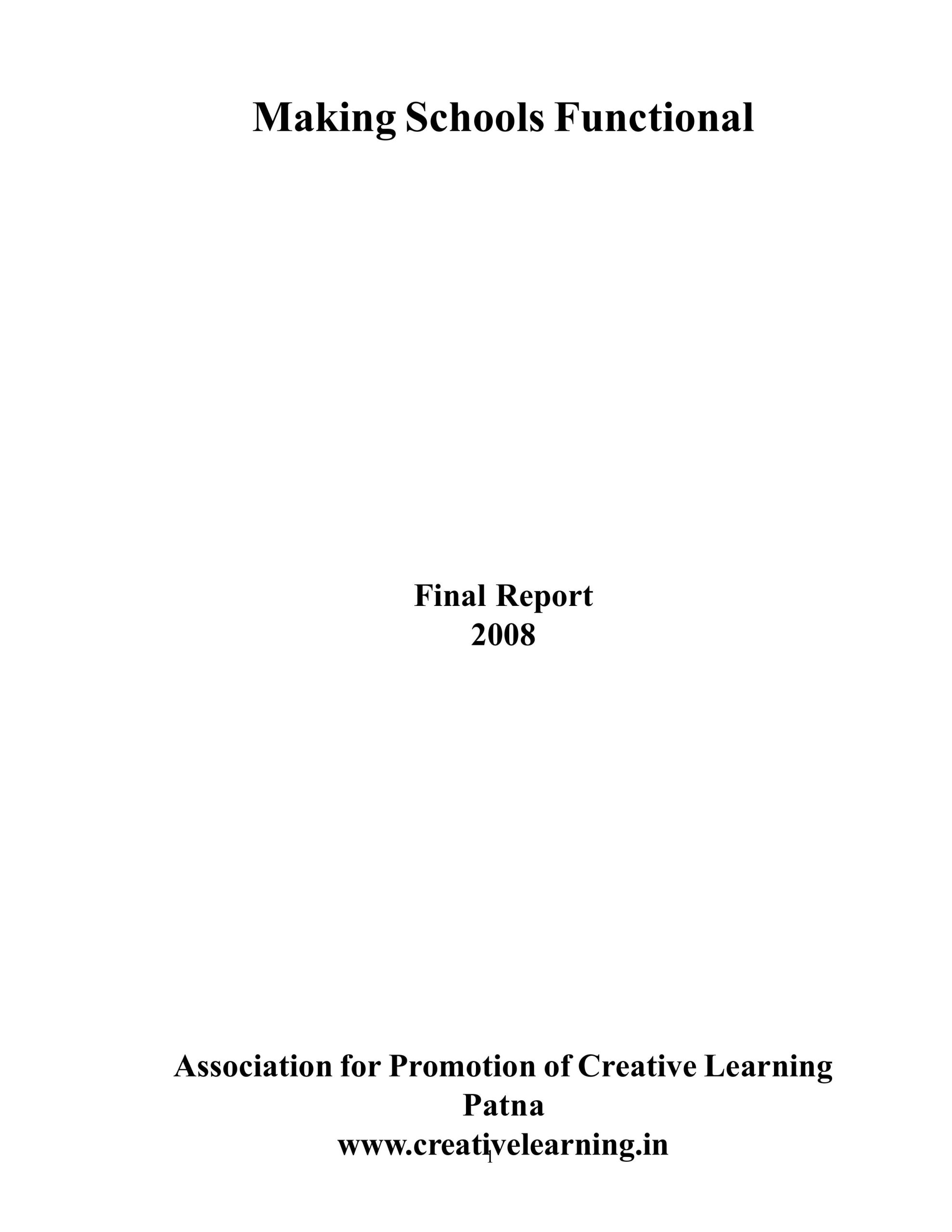
Making Schools Functional, 2008
The project outlines a year-long initiative by APCL to improve the functionality of government schools in underprivileged areas of Bihar, particularly in Jamsaut Panchayat. The project focused on empowering local communities, school bodies, and Panchayati Raj institutions to ensure educational accountability and quality. Activities included workshops for developing functional school indicators, Vidyalaya Chalo campaigns, community meetings, cultural celebrations like Saras Hori, and establishment of six Creative Learning Centres (Shabari Ashrams). Extensive community mobilisation, child tracking, and training programs for community mobilisers were conducted. Despite positive outcomes such as increased enrollments and enthusiastic community involvement, the report highlights systemic gaps - non-functional Vidyalaya Siksha Samitis, unutilized school funds, poor infrastructure, irregular mid-day meals, and delayed scholarship distribution. The report concludes with recommendations for Panchayat-level educational planning, better monitoring tools, and institutional reforms to ensure long-term educational transformation.
Broadstreaming Education for Underprivileged in Jamsaut Panchayat in Patna Bihar
Supported by ActionAid India, 2007
The project was a pioneering initiative by the Association for Promotion of Creative Learning (APCL), supported by ActionAid India, to promote educational inclusion in the Jamsaut Panchayat in Patna, Bihar. The project began with a detailed survey and transact walks across the region, identifying educational challenges faced by marginalized communities - particularly the Musahars. It led to the establishment of seven Creative Learning Centres (CLCs) or Shabari Ashrams, aimed at supplementing formal education through culturally rooted, activity-based learning. These centres engaged children using folk games, songs, storytelling, and crafts like terracotta modelling. Key activities included teacher training, community mobilisation, health camps, Bal Melas (children’s festivals), and workshops for stakeholders such as teachers, Panchayat members, and parents. The project emphasized using local knowledge and skills, nurturing multiple intelligences, and building inclusive educational ecosystems. It also highlighted the need for systemic reforms in government schools to make learning relevant and joyful for underprivileged children.
